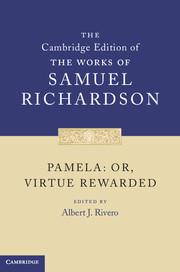Book contents
- Frontmatter
- Dedication
- Contents
- List of Illustrations
- General Editors’ Preface
- Acknowledgements
- Chronology
- List of Abbreviations
- General Introduction
- Textual Introduction
- Pamela: or, Virtue Rewarded
- Appendices
- Emendations
- Word-Division
- Bibliographical Descriptions of Early Editions
- Explanatory Notes
- Index
II - Contents From Octavo Edition (1742)
Published online by Cambridge University Press: 30 June 2022
- Frontmatter
- Dedication
- Contents
- List of Illustrations
- General Editors’ Preface
- Acknowledgements
- Chronology
- List of Abbreviations
- General Introduction
- Textual Introduction
- Pamela: or, Virtue Rewarded
- Appendices
- Emendations
- Word-Division
- Bibliographical Descriptions of Early Editions
- Explanatory Notes
- Index
Summary
The octavo edition of Pamela Richardson published in May 1742 was notable not only because of its high-quality paper and illustrations by Hayman and Gravelot, but also because it was fronted by a detailed table of contents of all four volumes. In his addendum to the preface, Richardson explains that he has omitted the commendatory letters as well as introduction present in previous editions because of the ‘kind Reception these Volumes have met with’ and the fact that ‘the most material Objections answer’d in the Introductory Preface, are taken notice of and obviated in the Third Volume’ (Preface, p. viii). Instead, ‘their place is supply’d, not unusefully, it is presum’d, by the following Epitome of the Work’ (ibid.). Though not so detailed as Richardson's ‘Index or Table of Contents’ to The Negotiations of Sir Thomas Roe (1740), which had been singled out for particular praise by the reviewer of that volume in The History of the Works of the Learned (May 1740), the ‘epitome’ of Pamela indicates to the reader that this is not merely a novel but an important ‘Work’. Pamela, in short, is worthy of serious critical attention and, therefore, merits the kind of critical apparatus accorded the papers and correspondence of a celebrated English diplomat. The contents of the first two volumes are reproduced below; the contents of the third and fourth volumes appear in Pamela in Her Exalted Condition.
CONTENTS OF THE FOUR VOLUMES.
It is thought proper to prefix to this Edition the following ample Table of CONTENTS, which may serve to revive theMemory of the principalMatters in the Minds of those who have read them, and to give an easy and clear View of what they contain, to those who have not, nor perhaps have Leisure to peruse them; at least, so carefully as may be necessary to answer the End of their Publication: And which, at the same time, will serve as a copious INDEX to direct the Reader where to find the most material Passages, as well as give an Idea of the entertaining and instructive Variety to be found in the Work.
Vol. I.
Letter
I. To her Parents. Recounting her Lady's Death.—HerMaster's Kindness to her. She is all grateful Confusion upon it, and thinks him the best of Gentlemen.
- Type
- Chapter
- Information
- Pamela: Or, Virtue Rewarded , pp. 481 - 497Publisher: Cambridge University PressPrint publication year: 2011

